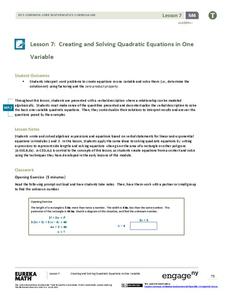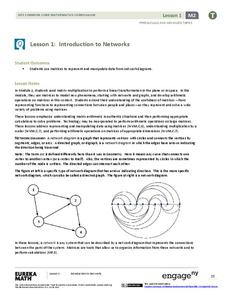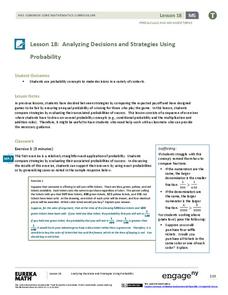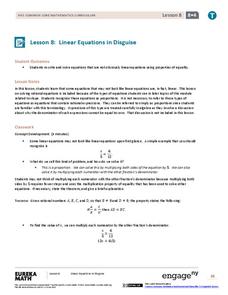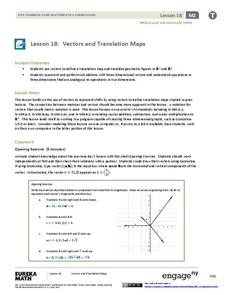EngageNY
Equations Involving a Variable Expression in the Denominator
0/0 doesn't equal 0! Begin this instructional activity by allowing the class to explore the concept of dividing by zero. The introduction allows for discovery and provides meaningful examples of dividing by zero. This understanding leads...
EngageNY
Creating and Solving Quadratic Equations in One Variable
Give your classes practice at modeling using quadratic models with a resource that uses area and integer problems to allow individuals to create second degree polynomials. Young mathematicians solve equations using factoring and then...
EngageNY
The Relationship Between Visual Fraction Models and Equations
Ours is to wonder why, not just to invert and multiply. The seventh installment of a 21-part module uses fraction models to help pupils understand why the invert-and-multiply strategy for dividing fractions works. They then work on some...
EngageNY
Introduction to Networks
Watch as matrices break networks down into rows and columns! Individuals learn how a network can be represented as a matrix. They also identify the notation of matrices.
EngageNY
Networks and Matrix Arithmetic
Doubling a network or combining two networks is quick and easy when utilizing matrices. Learners continue the network example in the second activity of this series. They practice adding, subtracting, and multiplying matrices by a scalar...
EngageNY
Solving Equations Involving Linear Transformations of the Coordinate Plane
How can matrices help us solve linear systems? Learners explore this question as they apply their understanding of transformation matrices to linear systems. They discover the inverse matrix and use it to solve the matrix equation...
EngageNY
Multiplying and Dividing Expressions with Radicals
That's radical! Simplifying radicals may not be exciting, but it is an important skill. A math lesson provides explanations of properties used throughout the material. Scholars practice skills needed to multiply and divide...
EngageNY
Complex Numbers as Vectors
Show your math class how to use vectors in adding complex numbers. Vectors represent complex numbers as opposed to points in the coordinate plane. The class uses the geometric representation to add and subtract complex numbers and...
EngageNY
Analyzing Decisions and Strategies Using Probability 1
Learn how to increase the probability of success. The 19th installment of a 21-part module teaches future mathematicians how to use probability to analyze decisions. They determine strategies to maximize the chances of a desired outcome.
EngageNY
Exponential Notation
Exponentially increase your pupils' understanding of exponents with an activity that asks them to explore the meaning of exponential notation. Scholars learn how to use exponential notation and understand its necessity. They use negative...
EngageNY
Linear Equations in Disguise
In the eighth segment of a 33-part unit, learners look at equations that do not appear to be linear at first glance. The equations are proportions where the numerators and denominators may have more than one term. To round out the...
EngageNY
The Decimal Expansion of Some Irrational Numbers
Develop a definition of irrational numbers through an exploration of square roots. The 11th instructional activity in this series of 25 asks scholars to estimate the value of a square root. Learners observe as the estimation extends...
EngageNY
The Order of Operations
Future mathematicians learn how to evaluate numerical expressions by applying the order of operations. They evaluate similar-looking expressions to see how the location of parentheses and exponents affects the value.
EngageNY
Replacing Letters with Numbers
When did letters become the same as numbers? Scholars learn about substituting numbers for letters to evaluate algebraic expressions in the seventh part in a series of 36. The lesson focuses on expressions related to geometry, such as...
EngageNY
Exponents
Powered up! Here's a great resource on exponents. Scholars build on their previous understanding of exponents to include all positive real number bases. Distinguishing between an and a^n is a major goal in the fifth lesson of a 36-part...
EngageNY
Writing and Evaluating Expressions—Exponents
Bring your young mathematicians into the fold. Scholars conduct an activity folding paper to see the relationship between the number of folds and the number of resulting layers in the 23rd installment of a 36-part module. The results of...
EngageNY
Vectors and Translation Maps
Discover the connection between vectors and translations. Through the lesson, learners see the strong relationship between vectors, matrices, and translations. Their inquiries begin in the two-dimensional plane and then progress to the...
EngageNY
Vectors in the Coordinate Plane
Examine the meaning and purpose of vectors. Use the lesson to teach your classes how find the magnitude of a vector and what it represents graphically. Your pupils will also combine vectors to find a resultant vector and interpret its...
Curated OER
Prime and Composite Numbers
Students identify prime and composite numbers. In this prime and composites lesson, students are given the rules for identifying prime and composite numbers by the teacher, who gives examples on the board. Individuals then complete a...
Curated OER
Operations with Fractions: Practice B
Students investigate operations with fractions. In this middle school mathematics lesson, students practices the operations of addition, subtraction, multiplication, and divisions of fractions.
Curated OER
Rabbits
Students review what they think doubling means and double numbers mentally, for example, 5, 12, 16. They share their solutions and discuss how they doubled. They work together on a problem that is beyond mental working and solve...
Curated OER
Modeling Addition: Commutative Property and Zero Property
First graders practice modeling addition. For this hands-on addition lesson plan, 1st graders are introduced to the Commutative Property of Addition and the Zero Property of Addition through modeling and the use of manipulatives. This...
Curated OER
Smart Doubling
Second graders use mental math in calculations involving addition and subtraction. They study doubles facts to work out addition problems mentally using part and or whole reasoning.
Curated OER
Compatible numbers to 20
Students practice theories dealing with equals sign used as a balance, inequality symbols and practice utilizing a box or some other geometric shape to represent an unknown number. They assess numeracy problems embedded in language-rick...



